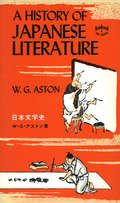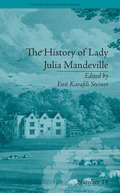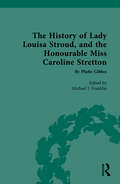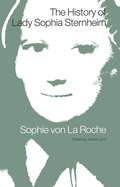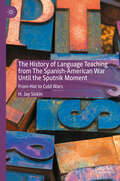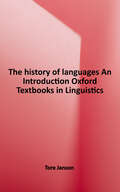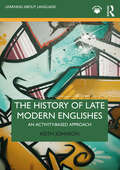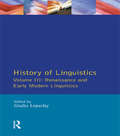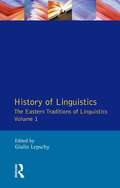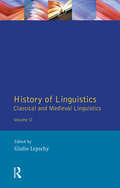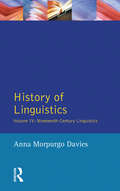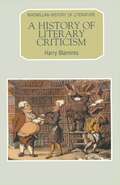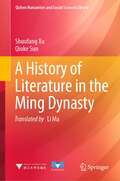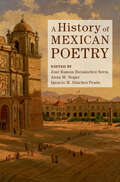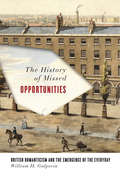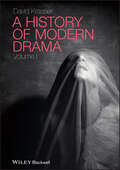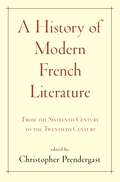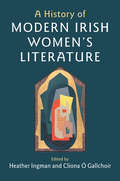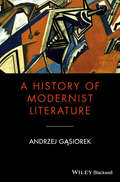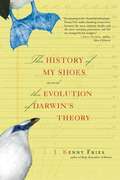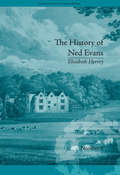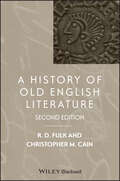- Table View
- List View
History of Japanese Literature
by William George AstonProfessor Aston's A History of Japanese Literature has a permanent place on the bookshelves of all lovers of Japan. William George Aston, who pioneered in the translation of Japanese literature into English, made many original contributions to Japanese studies. His writing is fresh and informative.The periods reviewed range from the ancient days, when Japan's history was just dawning, to the Meiji Restoration of 1868, when all aspects of Japanese life were being transformed. No aspect of Japanese culture escaped modification or change after Meiji, but Aston is mainly concerned with the profound literary heritage of Japan before Westernization.A long-time resident of Japan, who was intimately acquainted with Japanese books and scholars, he used the unique opportunities of his life to make available to English Readers the new world of Japanese literature. His scholarship is vast, yet he never loses the human touch, and he is always easy to read.
The History of Lady Julia Mandeville: by Frances Brooke (Chawton House Library: Women's Novels #14)
by Enit Karafili SteinerPublished in 1763, The History of Lady Julia Mandeville was Frances Brooke’s first and most successful novel. This modern critical edition contains an introductory essay on the text, endnotes and textual variants as well as appendices containing contemporary reviews and some of Brooke’s other writing.
The History of Lady Louisa Stroud, and the Honourable Miss Caroline Stretton: by Phebe Gibbes (Chawton House Library: Women's Novels)
by Michael J. FranklinThis new edition of the British epistolary novel The History of Lady Louisa Stroud, and the Honourable Miss Caroline Stretton examines the theme of female agency, and is an excellent example of women's writing in the eighteenth-century. The relationships of the author, Phebe Gibbes, with the East India Company, The London Magazine, ‘The Benevolent Society’, and the Royal Literary Society provide rich avenues for research. Accompanied by a new introduction and editorial commentary, this text will be of great interest to students of literary history and women's writing.
The History of Lady Sophia Sternheim (Pickering Women's Classics)
by J CollyerThe best-known novel of Sophie von La Roche, a German 18th-century woman writer. The plot reflects typical 18th-century concerns: the value of sentiment and the importance of virtue in attaining a good life. The publication of this novel reflects a recent revival of interest in the author.
The History of Language Teaching from The Spanish-American War Until the Sputnik Moment: From Hot to Cold Wars
by H. Jay SiskinThis book highlights the lively exchanges that shaped foreign-language pedagogy and educational policy during the first fifty years of the twentieth century. It is critically important to revivify our past, particularly in a field where innovation is conceptualized as progress and where knowledge production is a criterion for success. Modern language teaching began its ascendancy shortly before the turn of the twentieth century. In the academy, this impulse was marked by the founding of the Modern Language Association in 1883. Modern languages were increasingly recognized as possessing the mental and humanistic values that had formerly been the sole province of Greek and Latin. The book provides an overview of the historical, political, and social concerns that preoccupied the nation from 1898 and provides a context for analyzing the developments in the teaching of foreign languages over the course of the following century.
The History of Languages: An Introduction
by Tore JansonThis is an introduction to the history of languages, from the distant past to a glimpse at what languages may be like in the distant future. It looks at how languages arise, change, and ultimately vanish, and what lies behind their different destinies. What happens to languages, he argues, has to do with what happens to the people who use them, and what happens to people, individually and collectively, is affected by the languages they speak. <p><p>The book opens by examining what languages the hunter-gatherers might have spoken and the changes to language that took place when agriculture made settled communities possible. It then looks at the effects of the invention of writing, the formation of empires, the spread of religions, and the recent dominance of world powers, and shows how these relate to great changes in the use of languages. Tore Janson discusses the appearance of new languages, the reasons why some languages spread and others die, considers whether similar cyclical processes are found at different times and places, and examines the causes of internal changes in languages and dialects. The book ranges widely among the world's languages and mixes thematic chapters on general processes of change with accounts of specific languages, including Chinese, Arabic, Latin, Greek, and English.
The History of Late Modern Englishes: An Activity-based Approach (Learning about Language)
by Keith JohnsonThe History of Late Modern Englishes provides an accessible and student-friendly introduction to the history of the English language from the beginning of the eighteenth century up until the present day. Taking an activity-based approach, this text ensures that students learn by engaging with the fascinating evolution of this language rather than by simply reading about it. The History of Late Modern Englishes: • Covers the development of Englishes around the world, not only in the British Isles, but also in the United States, Canada, India, Singapore, Australia, New Zealand, and Melanesia, as well as in other countries around the world where English is used as a lingua franca; • Accommodates the needs of both native and non-native speakers of English, with helpful features such as a glossary of key terms and questions to guide the reader through the book; • Includes activity sections and discussion points to help students engage with the text; • Is accompanied by e-resources which include further activities and additional coverage of points of interest in the book. Written by an experienced teacher and author, this book is an essential course textbook for any module on the history of English and the perfect accompaniment to the author’s own The History of Early English.
History of Linguistics Vol III: Renaissance and Early Modern Linguistics (Longman Linguistics Library)
by Giulio C. LepschyTheHistory of Linguistics, to be published in five volumes, aims to provide the reader with an authoritative and comprehensive account of the attitudes to language prevailing in different civilizations and in different periods by examining the very varied development of linguistic thought in the specific social, cultural and religious contexts involved. Issues discussed include the place of language in education, variation and prestige, and approaches to lexical and grammatical description. The authors of the individual chapters are specialists who have analysed the primary sources and produced original syntheses by exploring the linguistic interests and assumptions of particular cultures in their own terms, without seeking to reinterpret them as contributions towards the development of contemporary western conceptions of linguistic science.The third volume of the History of Linguistics covers the Renaissance and the Early Modern Period. The chapter on the Renaissance (15th and 16th centuries), examines the study of Latin in both the new Humanist and rationalist traditions, along with the foundations of vernacular grammar in the study of Romance, Germanic and Slavic. The chapter on the Early Modern Period (17th and 18th centuries) presents the study of language in its philosophical context (Bacon, Port-Royal, Hobbes, Locke, Leibniz, the Enlightenment), as well as the accumulation of data which led to the foundation of Comparative Philology in the 19th century.
History of Linguistics Volume I: The Eastern Traditions of Linguistics (Longman Linguistics Library)
by Giulio LepschyThis comprehensive history of linguistics is part of a 5 volume set. Together, the volumes examine the social, cultural and religious functions of language, its place in education, the prestige attached to different varieties of language, and the presentation of lexical and grammatical descriptions. They explore the linguistic interests and assumptions of individual cultures in their own terms, without trying to transpose and reshape them into the context of contemporary ideas of what the scientific study of language ought to be. The authors of individual chapters are all specialists who have been able to analyse the primary sources, and so produce original syntheses which offer an authoritative view of the different traditions and periods. Volime One examines the developments of Chinese linguistics, Indian grammatical tradition, the linguistic interests of the Near East, the Hebrew tradition, and the Arabic grammatical system of the Middle Ages.
History of Linguistics Volume II: Classical and Medieval Linguistics (Longman Linguistics Library)
by Giulio C. LepschyThis comprehensive history of linguistics is part of a 5 volume set. Together, the volumes examine the social, cultural and religious functions of language, its place in education, the prestige attached to different varieties of language, and the presentation of lexical and grammatical descriptions. They explore the linguistic interests and assumptions of individual cultures in their own terms, without trying to transpose and reshape them into the context of contemporary ideas of what the scientific study of language ought to be. The authors of individual chapters are all specialists who have been able to analyse the primary sources, and so produce original syntheses which offer an authoritative view of the different traditions and periods. Volume Two examines the Greek, Roman and Medieval European traditions, which between them developed the grammatical and syntactical models which form the basis of our inherited linguistic assumptions.
History of Linguistics, Volume IV: Nineteenth-Century Linguistics (Longman Linguistics Library)
by Anna Morpurgo Davies Giulio C. LepschyThe History of Linguistics, to be published in five volumes, aims to provide the reader with an authoritative and comprehensive account of the attitudes to language prevailing in different civilizations and in different periods by examining the very varied development of linguistic thought in the specific social, cultural and religious contexts involved. Issues discussed include the place of language in education, variation and prestige, and approaches to lexical and grammatical description. The authors of the individual chapters are specialists who have analysed the primary sources and produced original syntheses by exploring the linguistic interests and assumptions of particular cultures in their own terms, without seeking to reinterpret them as contributions towards the development of contemporary western conceptions of linguistic science.In Volume IV: Nineteenth Century Linguistics, Anna Morpurgo Davies shows how linguistics came into its own as an independent discipline separated from philosophical and literary studies and enjoyed a unique intellectual and institutional success tied to the research ethos of the new universities, until it became a model for other humanistic subjects which aimed at 'scientific status'. The linguistics of the nineteenth century abandons earlier theoretical discussions in favour of a more empirical and historical approach using new methods to compare languages and to investigate their history. The great achievement of this period is the demonstration that languages such as Sanskrit , Latin and English are related and derive from a parent language which is not attested but can be reconstructed. This book discusses in detail the theories developed and the individual findings obtained. In contrast with earlier historiographical trends it denies that the new approach originated entirely from German Romanticism, and highlights a form of continuity with the eighteenth century, while stressing that a deliberate break took place round the 1830s. By the end of the century the results of comparative and historical linguistics had been generally accepted, but it soon became clear that a historical approach could not by itself solve all questions that it raised. At this point the new interest in description and theory which characterizes the twentieth century began to gain prominence.
A History of Literary Criticism
by Michael MoronyThe author traces the course of literary criticism from its foundations in classical and medieval precepts to the theorising of the present day. He explores the texts which have been milestones in the history of critical thought, placing them firmly in the context of their time.
A History of Literature in the Ming Dynasty (Qizhen Humanities and Social Sciences Library)
by Shuofang Xu Qiuke SunThis book explores poems, novels, legends, operas and other genres of writing from the Ming Dynasty. It is composed of two parts: the literary history; and comprehensive reference materials based on the compilation of several chronologies. By studying individual literary works, the book analyzes the basic laws of the development of literature during the Ming Dynasty, and explores the influences of people, time, and place on literature from a sociological perspective. In turn, it conducts a contrastive analysis of Chinese and Western literature, based on similar works from the same literary genre and their creative methods. The book also investigates the relationship between literary theory and literary creation practices, including those used at various poetry schools. In closing, it studies the unique aesthetic traits of related works. Sharing valuable insights and perspectives, the book can serve as a role model for future literary history studies. It offers a unique resource for literary researchers, reference guide for students and educators, and lively read for members of the general public.
A History of Mexican Literature
by Anna M. Nogar Sánchez Prado Ignacio M. Serra José Ramón RuisánchezA History of Mexican Literature chronicles a story more than five hundred years in the making, looking at the development of literary culture in Mexico from its indigenous beginnings to the twenty-first century. Featuring a comprehensive introduction that charts the development of a complex canon, this History includes extensive essays that illuminate the cultural and political intricacies of Mexican literature. Organized thematically, these essays survey the multilayered verse and fiction of such diverse writers as Sor Juana Inés de la Cruz, Mariano Azuela, Xavier Villaurrutia, and Octavio Paz. Written by a host of leading scholars, this History also devotes special attention to the lasting significance of colonialism and multiculturalism in Mexican literature. This book is of pivotal importance to the development of Mexican writing and will serve as an invaluable reference for specialists and students alike.
A History of Mexican Poetry
by Serra, José Ramón Ruisánchez Anna M. Nogar Sánchez Prado, Ignacio M.Covering Mexican literary history from pre-Columbian literature to the twenty-first-century, including works from Greater Mexico, this book is the most comprehensive study on Mexican poetry available in English. It examines key authors, such as Bernando de Balbuena, Juana de Asbaje, Ramón López Velarde, José Gorostiza, and Octavio Paz, and considers how they should be read today. Individual chapters focus on important movements, poetic forms, and topics, such as epics, lyric poetry, romanticism, modernism, poetry and performance, poetry in indigenous languages, Mexican American and Chicanx poetry, and the relationship between Mexican literature and gender. This book provides a global understanding of Mexican poetry, its institutions and its main authors for students and scholars in any discipline connected to the subject.
The History of Missed Opportunities: British Romanticism and the Emergence of the Everyday
by William GalperinThrough close engagement with the work of Wordsworth, Austen, and Byron, The History of Missed Opportunities posits that the everyday first emerged as a distinct category of experience, or first became thinkable, in the Romantic period. Conceived here as something overlooked and only noticed in retrospect, the everyday not only becomes subject matter for Romanticism, it also structures Romantic poetry, prose, and writing habits. Because the everyday is not noticed the first time around, it comes to be thought of as a missed opportunity, a possible world that was not experienced or taken advantage of and of whose history—or lack thereof—writers become acutely conscious. Consciousness of the everyday also entails a new relationship to time, as the Romantics turn to the history of what might have been. In recounting Romanticism's interest in making things recurrently present, in recovering a past of what was close at hand yet underappreciated, William H. Galperin positions the Romantics as precursors to twentieth-century thinkers of the everyday, including Heidegger, Benjamin, Lefebvre, and Cavell. He attends to Romantic discourse that works at cross purposes with standard accounts of both Romanticism and Romantic subjectivity. Instead of individualizing or turning inward, the Romantics' own discourse depersonalizes or exhibits a confrontation with thing-ness and the material world.
A History of Modern Drama, Volume I: 1960-2000
by David KrasnerCovering the period 1879 to 1959, and taking in everything from Ibsen to Beckett, this book is volume one of a two-part comprehensive examination of the plays, dramatists, and movements that comprise modern world drama. Contains detailed analysis of plays and playwrights, connecting themes and offering original interpretations Includes coverage of non-English works and traditions to create a global view of modern drama Considers the influence of modernism in art, music, literature, architecture, society, and politics on the formation of modern dramatic literature Takes an interpretative and analytical approach to modern dramatic texts rather than focusing on production history Includes coverage of the ways in which staging practices, design concepts, and acting styles informed the construction of the dramas
A History of Modern French Literature: From the Sixteenth Century to the Twentieth Century
by Christopher PrendergastAn accessible and authoritative new history of French literature, written by a highly distinguished transatlantic group of scholarsThis book provides an engaging, accessible, and exciting new history of French literature from the Renaissance through the twentieth century, from Rabelais and Marguerite de Navarre to Samuel Beckett and Assia Djebar. Christopher Prendergast, one of today's most distinguished authorities on French literature, has gathered a transatlantic group of more than thirty leading scholars who provide original essays on carefully selected writers, works, and topics that open a window onto key chapters of French literary history. The book begins in the sixteenth century with the formation of a modern national literary consciousness, and ends in the late twentieth century with the idea of the "national" coming increasingly into question as inherited meanings of "French" and "Frenchness" expand beyond the geographical limits of mainland France.Provides an exciting new account of French literary history from the Renaissance to the end of the twentieth centuryFeatures more than thirty original essays on key writers, works, and topics, written by a distinguished transatlantic group of scholarsIncludes an introduction and indexThe contributors include Etienne Beaulieu, Christopher Braider, Peter Brooks, Mary Ann Caws, David Coward, Nicholas Cronk, Edwin M. Duval, Mary Gallagher, Raymond Geuss, Timothy Hampton, Nicholas Harrison, Katherine Ibbett, Michael Lucey, Susan Maslan, Eric Méchoulan, Hassan Melehy, Larry F. Norman, Nicholas Paige, Roger Pearson, Christopher Prendergast, Jean-Michel Rabaté, Timothy J. Reiss, Sarah Rocheville, Pierre Saint-Amand, Clive Scott, Catriona Seth, Judith Sribnai, Joanna Stalnaker, Aleksandar Stević, Kate E. Tunstall, Steven Ungar, and Wes Williams.
A History of Modern Irish Women's Literature
by Heather Ingman Clíona Ó GallchoirThis book offers the first comprehensive survey of writing by women in Ireland from the seventeenth century to the present day. It covers literature in all genres, including poetry, drama, and fiction, as well as life-writing and unpublished writing, and addresses work in both English and Irish. The chapters are authored by leading experts in their field, giving readers an introduction to cutting edge research on each period and topic. Survey chapters give an essential historical overview, and are complemented by a focus on selected topics such as the short story, and key figures whose relationship to the narrative of Irish literary history is analysed and reconsidered. Demonstrating the pioneering achievements of a huge number of many hitherto neglected writers, A History of Modern Irish Women's Literature makes a critical intervention in Irish literary history.
A History of Modernist Literature (Blackwell History of Literature)
by Andrzej GasiorekA History of Modernist Literature offers a critical overview of modernism in England between the late 1890s and the late 1930s, focusing on the writers, texts, and movements that were especially significant in the development of modernism during these years. A stimulating and coherent account of literary modernism in England which emphasizes the artistic achievements of particular figures and offers detailed readings of key works by the most significant modernist authors whose work transformed early twentieth-century English literary culture Provides in-depth discussion of intellectual debates, the material conditions of literary production and dissemination, and the physical locations in which writers lived and worked The first large-scale book to provide a systematic overview of modernism as it developed in England from the late 1890s through to the late 1930s
A History of Modernist Poetry
by Davis, Alex and Jenkins, Lee M. Alex Davis Lee M. JenkinsA History of Modernist Poetry examines innovative anglophone poetries from decadence to the post-war period. The first of its three parts considers formal and contextual issues, including myth, politics, gender, and race, while the second and third parts discuss a wide range of individual poets, including Ezra Pound, T. S. Eliot, W. B. Yeats, Mina Loy, Gertrude Stein, Wallace Stevens, William Carlos Williams, and Marianne Moore, as well as key movements such as Imagism, Objectivism, and the Harlem Renaissance. This book also addresses the impact of both World Wars on experimental poetries and the crucial role of magazines in disseminating and proselytizing on behalf of poetic modernism. The collection concludes with a wide-ranging discussion of the inheritance of modernism in recent writing on both sides of the Atlantic.
The History of My Shoes and the Evolution of Darwin's Theory
by Kenny Fries<p>In The History of My Shoes, Kenny Fries narrates two stories: the development of the theory of "survival of the fittest," as articulated by Charles Darwin and Alfred Russel Wallace; and the history of his ever-changing, made-to-order, orthopedic shoes. <p>The famously important first story, as told by Kenny Fries, is a condensed and colorful account of the race between Darwin and Wallace to formulate their groundbreaking theories. <p>At the same time, Fries, a gay and disabled man, tells a deeply personal story of the evolving consciousness of his own "adaptations," represented by his shoes. As a child, Fries was abused by both his father and brother, and emerged into adulthood swaddled in ambiguities of self and memory. <p>These he has explored in his brutally frank memoir, Body, Remember. In this poetic, introspective book, Kenny Fries imaginatively illustrates how his identities intersect. He writes, "Much of my own work the past fifteen years has been concerned with the body, as both subject and metaphor; as the place where the personal becomes the universal; as the site of memory, language, and desire." <P>Although only the "fittest" may survive, Fries learns that adaptation and variation are critical to survival. What is deemed normal, or even perfect, are passing phases of the ever-changing embodiment of nature in our world. In the end, Darwin and Wallace's discoveries resonate with Fries's own story in The History of My Shoes.
The History of Ned Evans: by Elizabeth Hervey (Chawton House Library: Women's Novels)
by Helena KellyNed Evans is a rags-to-riches hero, whose early existence in poverty in Wales is dramatically changed when he saves the beautiful Lady Cecilia Rivers from an assault and is invited to Ireland by her father. After spending time with the great and the good of Irish society, Ned travels to America where his fortunes once more reverse.
A History of New Zealand Literature
by Mark WilliamsA History of New Zealand Literature traces the genealogy of New Zealand literature from its first imaginings by Europeans in the eighteenth century. Beginning with a comprehensive introduction that charts the growth of, and challenges to, a nationalist literary tradition, the essays in this History illuminate the cultural and political intricacies of New Zealand literature, surveying the multilayered verse, fiction and drama of such diverse writers as Katherine Mansfield, Allen Curnow, Frank Sargeson, Janet Frame, Keri Hulme, Witi Ihimaera and Patricia Grace. Written by a host of leading scholars, this History devotes special attention to the lasting significance of colonialism, biculturalism and multiculturalism in New Zealand literature. A History of New Zealand Literature is of pivotal importance to the development of New Zealand writing and will serve as an invaluable reference for specialists and students alike.
A History of Old English Literature
by Robert D. Fulk Christopher M. CainThis revised edition of A History of Old English Literature draws extensively on the latest scholarship to have evolved over the last decade. The text incorporates additional material throughout, including two new chapters on Anglo-Saxon manuscripts and incidental and marginal texts.This revised edition responds to the renewed historicism in medieval studiesProvides wide-ranging coverage, including Anglo-Latin literature as well as non-canonical writingsIncludes new chapters on manuscripts and on marginal and incidental textsIncorporates expanded coverage of legal texts and scientific and scholastic texts, now treated in separate chaptersDemonstrates that the field of Anglo-Saxon studies is uniquely placed to contribute to current literary debates
